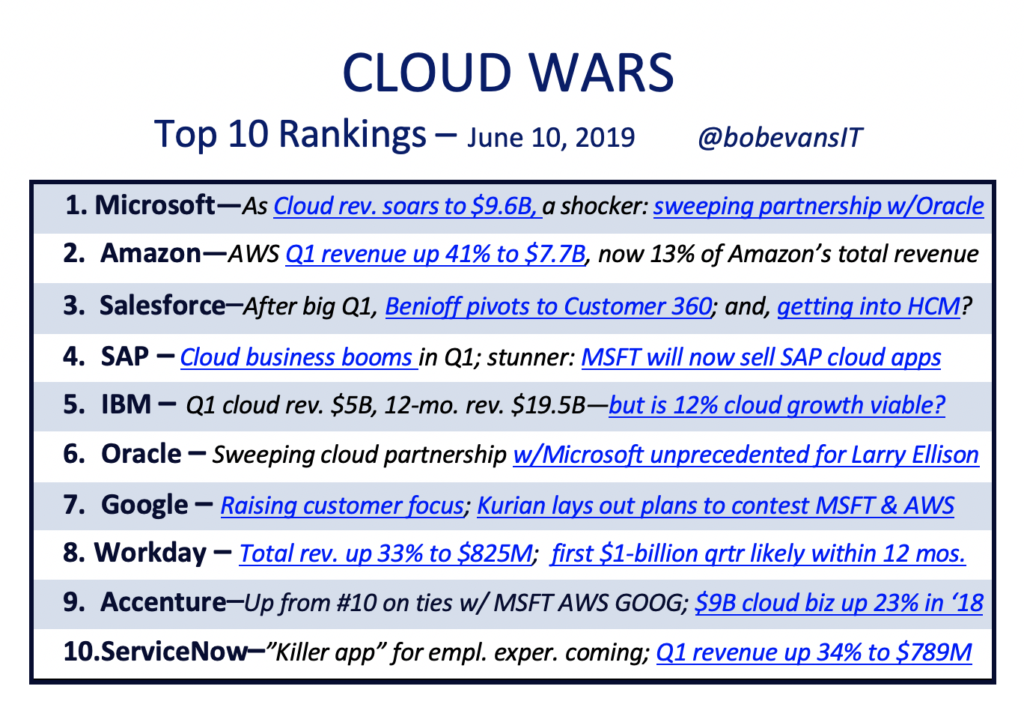Spending aggressively to enable data-driven customer success, Google Cloud and Salesforce are investing $18 billion through acquisitions to help their business customers deliver better experiences to their consumers by making those businesses smarter about how they use and leverage data.
In another clear indicator that the business world is digitalizing rapidly and comprehensively, the bookend acquisitions—they were disclosed about 72 hours apart—of data specialists Looker and Tableau have raised the stakes for success in the Cloud Wars rapidly and significantly.

Late last week, Google Cloud announced plans to acquire Looker for $2.6 billion, and early Monday morning Salesforce said it intends to acquire Tableau for $15.3 billion.
Feeding Business Customers’ Insatiable Appetite for Data Expertise
One of the things that struck me about these two deals is the profile of the two acquiring companies, Salesforce and Google Cloud:
- Salesforce is the world’s largest SaaS provider by a wide margin, and expects to generate about $13.5 billion in total revenue this fiscal year, with the vast majority of that coming from SaaS.
- Conversely, while Google Cloud is known primarily as a heavyweight in the IaaS sector of the cloud, new CEO Thomas Kurian has made it perfectly clear that he intends to dramatically strengthen the company’s presence “up the stack” with a stronger SaaS portfolio.
In spite of those differences in profile, the strategic intent for both Salesforce and Google Cloud in making these acquisitions is to enhance their standings among customers and prospects. They’ll do this by demonstrating deep abilities to help business customers use data to increase growth and improve customer experiences.
Take a look at the comments about the respective deals from the CEOs involved.
Google Cloud CEO Thomas Kurian on Looker’s Strategic Significance
Here’s Google Cloud CEO Thomas Kurian on why his company’s so excited about joining forces with Looker, “a unified platform for business intelligence, data applications, and embedded analytics.”
First, on the analytics front:
“The addition of Looker to Google Cloud will help us offer customers a more complete analytics solution from ingesting data to visualizing results and integrating data and insights into their daily workflows. It will also help us deliver industry specific analytics solutions in our key verticals, whether that’s supply chain analytics in retailing; media analytics in entertainment; or healthcare analytics at global scale.”
Plus, supercharging data management:
“A fundamental requirement for organizations wanting to transform themselves digitally is the need to store, manage, and analyze large quantities of data from a variety of sources. Google Cloud offers customers a broad and integrated suite of cloud services to ingest data in real time, cleanse it, process it, aggregate it in a highly scalable data warehouse and analyze it.”
And tools for decision-making:
“Looker extends our business analytics offering with two important capabilities—first, the ability to define business metrics once in a consistent way across data sources. This makes it easy for anyone to query data while maintaining consistent definitions in their calculations, ensuring teams get accurate results. Second, Looker also provides users with a powerful analytics platform that delivers applications for business intelligence and use-case specific solutions such as Sales Analytics, as well as a flexible, embedded analytics product to collaborate on business decisions.”
Finally, upscaling Looker’s already strong capabilities:
“Looker customers can rest assured that the high-quality support experience that Looker has provided will be bolstered by the resources, expertise, and global presence of our Cloud team… We’re thrilled to bring more robust data management solutions to our customers and look forward to welcoming the Looker team to Google Cloud.”
What Salesforce and Marc Benioff Expect to Gain with Tableau
Here’s Salesforce co-CEO Marc Benioff and others on his company’s big-time bid for Tableau. By my math, Salesforce is paying about 40x revenue. The press release on the announcement says Tableau will boost Salesforce revenue by somewhere between $350 million and $400 million in Salesforce’s fiscal year (Feb. 1 to Jan. 31), and if we take the midpoint of that ($375 million) and divide into $15.3 billion, we get a multiple of 40.8. Clearly, it’s an incredibly important deal for Salesforce and its customers.
“Tableau helps people see and understand data, and Salesforce helps people engage and understand customers. It’s truly the best of both worlds for our customers–bringing together two critical platforms that every customer needs to understand their world.”
From Salesforce co-CEO Keith Block: “Data is the foundation of every digital transformation, and the addition of Tableau will accelerate our ability to deliver customer success by enabling a truly unified and powerful view across all of a customer’s data.”
From the Salesforce press release announcing the agreement: “Companies of every size and industry are transforming how they do business in the digital age—customers and data are at the heart of those transformations.
“With Tableau, Salesforce will play an even greater role in driving digital transformation, enabling companies around the world to tap into data across their entire business and surface deeper insights to make smarter decisions, drive intelligent, connected customer experiences and accelerate innovation.”
Subscribe to the Cloud Wars Newsletter for in-depth analysis of the major cloud vendors from the perspective of business customers. It’s free, it’s exclusive, and it’s great!








